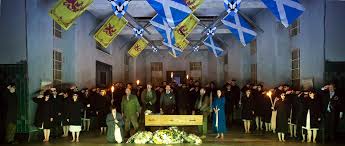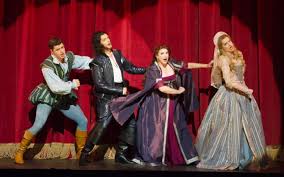Mayflower, Southampton, 1-3 November 2016
WNO have been theming their seasons for some time now and so it was inevitable that this year would provide a Shakespeare slot. However, the outcome was not quite what one might have expected. Though each of the three works chosen had their enjoyable moments none of them was of the high standard we have come to expect from WNO.
Firstly the works themselves – Andre Tchaikovsky’s The Merchant of Venice; Verdi’s Macbeth; Cole Porter’s Kiss me Kate. Any one of these alongside greater works – Otello, Falstaff, even Beatrice & Benedict – would have made sense, but three works all from the second tier does not.
Tchaikovsky’s opera dates from the 1980s when it was turned down by ENO, and one can sense why. Scored in post-Bergian style it is relentless in attack throughout, with few reflective moments and little sense of individual characterisation. While this works quite well in the opening Venetian act it is far less convincing in the Belmont scenes. Character seems to come from the individual singers rather than the score, and here Lester Lynch is an impressive Shylock. The scene in the stock exchange is particularly effective as it becomes clear that it is Antonio who is the outsider rather than Shylock. Counter-tenor Martin Wolfel is an aloof Antonio and the younger men are given no individual personalities. Sarah Castle does what she can with Portia though the score does not give her much scope for developing a broader interpretation. Keith Warner has impressed as a director over the years and the outer acts work well, but the poor setting for act two, with its mishandled caskets, was simply not good enough.
Had this been the one problem across the week it might have been acceptable but the following night’s Macbeth had an equal share of problems. It may be that the stage crew was simply not used to the set but the gaps between scenes were simply far too long and any continuity that Andriy Yurkevych was trying to create in the pit was lost in the silences. Luis Cansino was a stalwart Macbeth and Bruce Sledge an eloquent Macduff. Miriam Murphy has a very large voice to go with her large stage presence. In the opening scenes this was on the wild side even if exciting in its impact. As the evening progressed it came under better control and the sleep-walking scene was effective. Her acting however was perfunctory and it was unclear what Oliver Mears was attempting in his direction. I liked Annemarie Woods’ design, setting the whole in an abandoned hospital. The sense of a place which should bring healing providing only destruction was often poignantly made. In the final scene Macbeth sits at an invalid’s table, reminding us of the sickness he has brought to society. Moments like this worked well though what on earth the witches were supposed to be was anybody’s guess. At times they seemed to be sending themselves up but I can’t think this was intended. Orchestra and chorus were in fine form and the music overcame the sticker moments in the production.
We seem to have had quite a few presentation of Kiss Me Kate recently. It is a work I really enjoy and there was a great deal to please here, if only in comparison to the two previous evenings. In addition, the score being used was the full orchestral version and included much music I had not encountered before – always a bonus for potentially jaded critics. However the production had an air of amateurism about its setting and presentation. It really did look like a touring version at the end of a very long run. While most of the music under James Holmes was exhilarating the dialogue too frequently lowered the temperature, particularly in the first half. Thankfully the dancing was splendid, with Too darned hot and Bianca being particularly impressive.
Accents were wayward throughout, with little sense of time or place. If these seem like quibbles then they are points which could easily have been addressed and the whole evening given a fizz which it too often lacked.
Quirijn de Lang brought a suitably Douglas Fairbanks virility to Fred Graham and sang with panache. Jeni Bern was a positive foil as Lilli Vanessi but did not have the lyricism the role needs. Alun Birkitt taps as splendidly as he sings, and became the one really joyous moment of the evening.
I wish I could be more enthusiastic about the company at the moment, for over recent years we have seen many magnificent performances and much wonderful singing. Let us hope that the revivals of La Boheme and Madama Butterfly in the spring will return things to a more even keel.


